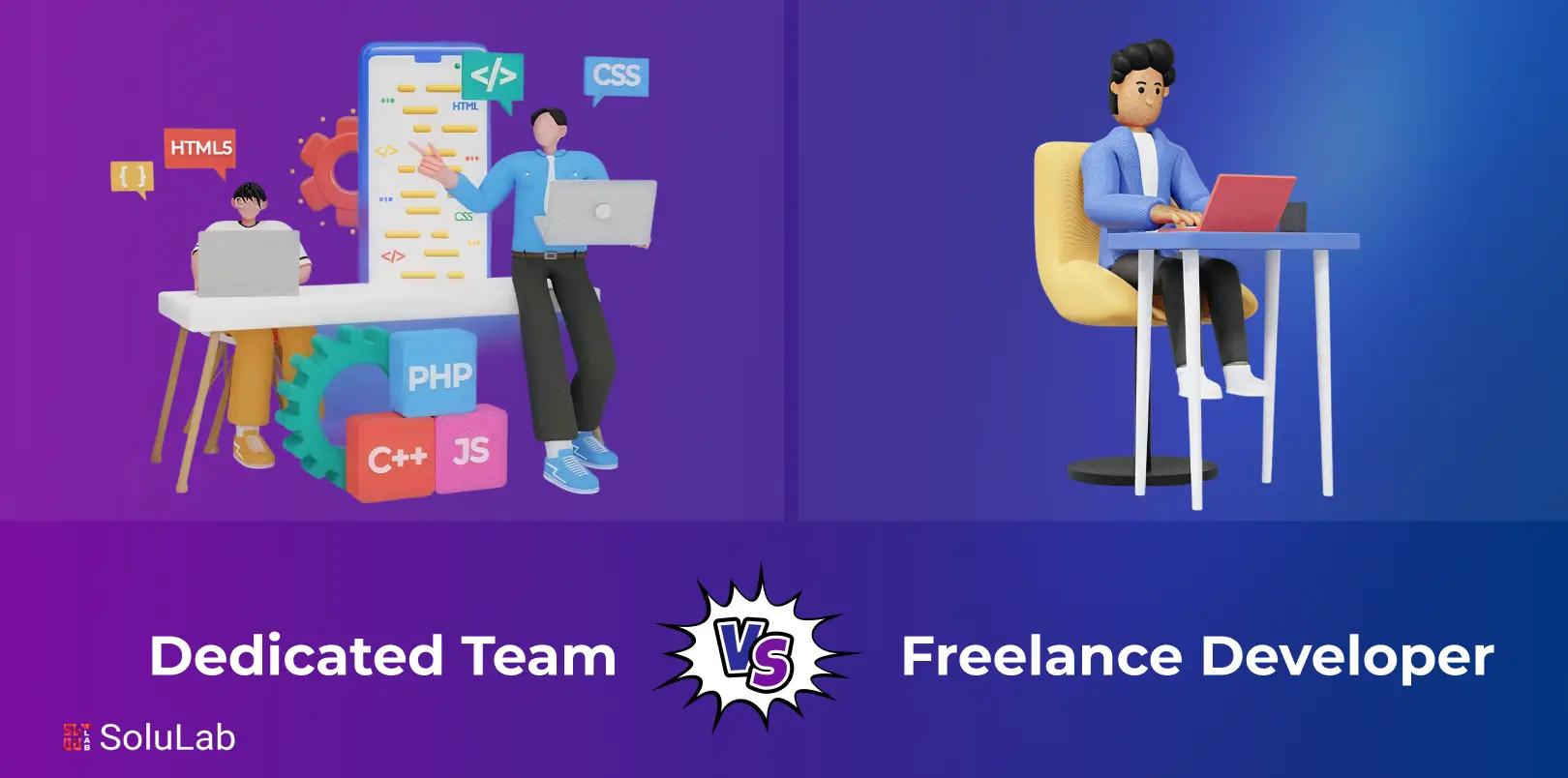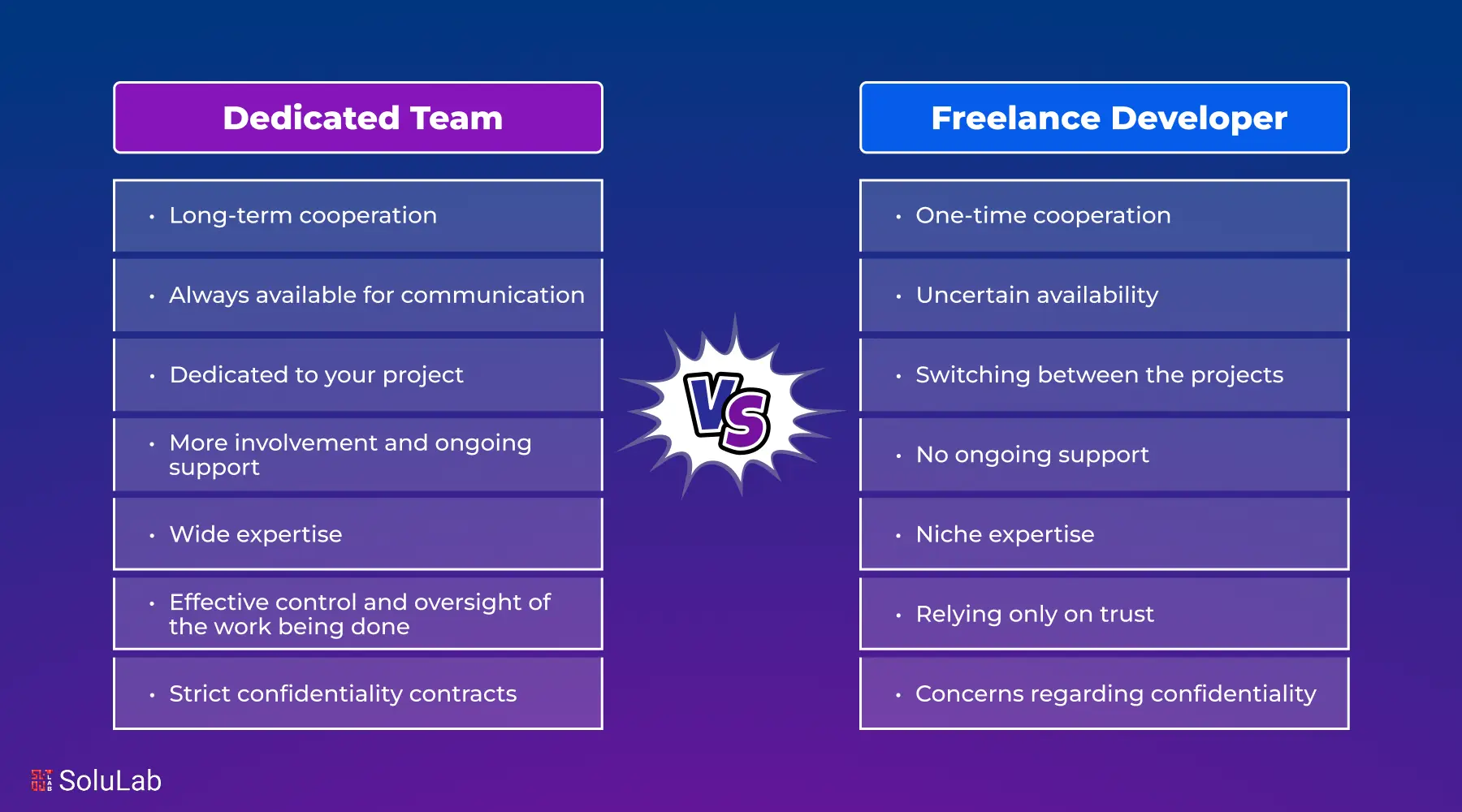
Deciding between a dedicated team and a freelance developer isn’t just a technical choice; it could shape how smooth, cost-effective, and successful your project turns out to be. Both options have their strengths, depending on what you’re building, how much you’re willing to spend, and how fast you need it done.
A dedicated team provides you with structure, long-term support, and a combination of specialized skills. On the other hand, freelancers offer more flexibility and can be a great fit for shorter, task-based work, especially when you’re on a tighter budget.
In this guide, we’ll break down the pros, cons, and real-world use cases to help you choose what’s best for your project.
What is a Dedicated Development Team?
A dedicated development team is a group of developers, designers, testers, and sometimes even project managers, hired to work exclusively on your project. They don’t juggle multiple clients.
This setup is ideal if you’re building something long-term, such as a product that will require ongoing updates, an app that needs continuous improvements, or a SaaS platform that requires regular support. With an expected CAGR of 8.28% from 2025 to 2029, this pattern of growth is expected to continue, with a market volume of US$812.71 billion by that year.
The best part? You don’t have to spend hours on hiring, training, or managing everything in-house. It’s like having an extended arm of your company, minus the overhead.
Advantages of Hiring Dedicated Developers
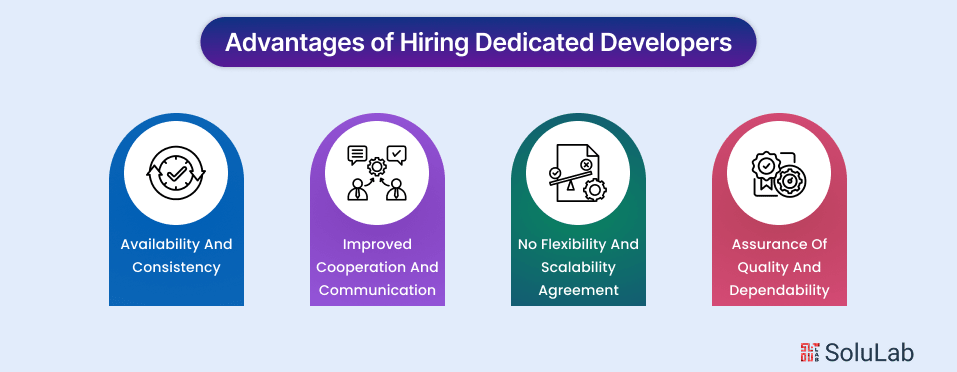
Here are some advantages of hiring a dedicated developer team you should be aware of:
1. Availability and Consistency: With constant project focus, committed developers provide stability and sustained dedication to the project. Their constant availability enables smoother cooperation, quicker problem-solving, and improved alignment with corporate objectives.
2. Improved Cooperation and Communication: By collaborating closely with your team, specialized developers will guarantee smooth integration with your workflow and open communication. Better coordination, quicker decision-making, and an effective development process are all improved by this.
3. Flexibility and Scalability: By providing flexibility, committed developers will assist you in scaling up or down your team as required for the project. This means that you won’t have to sacrifice effectiveness or quality to swiftly adjust to your changing requirements or expanding company.
4. Assurance of Quality and Dependability: You can guarantee access to a workforce that provides excellent development, proven competence, and continuous support when you engage remote developers. Their dedication to the project reduces mistakes, increases dependability, and guarantees efficient progress.
What is a Freelance Developer?
A freelance developer is someone you could hire for a specific task, project, or time frame. Without bringing them on as a full-time team member. A freelancer is a go-to expert you’d call when you need something built quickly.
They work with multiple clients and bring a mix of skills and experiences from different industries. That means they could offer fresh ideas and flexibility you might not get from a full-time hire. Approximately 1.57 billion people worldwide are freelancers, accounting for 46.7% of the global workforce.
You could hire a freelance developer to build a landing page, fix bugs, develop an MVP, or even just consult on tech decisions as well. And because they often work solo, you would need to manage timelines and expectations to make things run smoothly.
If your project is small, short-term, or you just want to test an idea without a big commitment, a freelancer could be the perfect fit.
Advantages of Hiring Freelance Developers
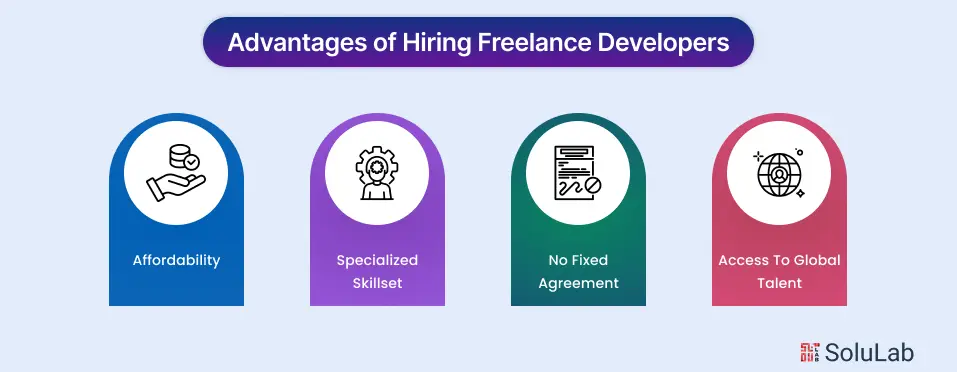
There are some key benefits to hiring freelance developers that you should know.
1. Affordability: Because they are cheaper, freelancers are a good pick for small projects or new companies. Due to flexible pricing, firms can be charged just for hours worked or certain services.
2. Specialized Skillset: Because freelancers are usually experienced in specific skills or technology, they can handle difficult specialty projects well. Having experience on different projects allows businesses to pick those who possess the essential technical skills.
3. No Fixed Agreement: You don’t have to stick with a freelance developer for a long period. It’s possible to hire them for a week, a month, or until a project is finished. As a result, you can increase or decrease your server resources to fit your project.
4. Access to Global Talent: It’s possible to hire a React specialist from India, a UI designer from Poland, or a blockchain developer from Singapore, all from your home computer.
Dedicated Team vs Freelance Developer: A Head-to-Head Comparison
There are several considerations when deciding between a committed team and a freelance developer. Short-term projects are best suited for freelancers, but long-term development requirements are best served by committed teams.
Companies must evaluate their needs, financial constraints, and technological expectations before making a decision. The following elements should be taken into account when deciding between a freelance developer and a committed team:
-
Cost
Since freelancers cost less, they are often a good fit for those working on a budget. Yet, if you have a dedicated team, you may end up paying more, but you can count on the same results, faster deliveries, and future benefits. Your decision will be based on whether you’re looking for short-term or a return in the long run.
-
Time & Availability
A dedicated developer group is working on your project all the time, ensuring that it’s done quickly and you’re always able to reach them. Being responsible for many clients, freelancers may face delays, especially when their task comes second to others.
-
Expertise & Collaboration
Having a dedicated team means there are designers, developers, and project managers to balance their skills. It’s obvious how smoothly they operate together. A freelancer often specializes, although you’ll need to handle or hire for everything except that service.
-
Data Security & Reliability
Security practices may not be followed by freelancers until their importance is taught and enforced. In most cases, a team committed to this work operates in an agency or strict environment, where expectations for data safety and agreements are the norm. When you handle confidential information, this could be a main reason to choose.
-
Communication & Workflow
Freelancers might rather communicate without real-time contact, which can make things slow and cause errors. Working according to a plan, many teams often get regular updates, work with Jira or Slack, and have project managers steering the progress. It can make your job much simpler when you manage larger projects.
-
Scalability & Flexibility
Do you need to grow your staff quickly? A business with a dedicated team can bring in extra developers or designers with little to no delay. For freelancers, to scale means finding and training new people from the beginning. Given this, if you’re looking to grow, teams can give more flexibility in the future.
When Should You Hire a Dedicated Team?
If you’re working on something big or long-term, a dedicated team could be the smarter choice. Here’s when it makes the most sense:
- Scaling Startups: When your startup is growing fast, you’ll need consistent support to keep up with new features, updates, and user demands. A dedicated team would help you scale without constantly rehiring.
- Specialised Expertise: If your project requires niche skills like AI, fintech, or blockchain, a dedicated team could bring in focused experts who understand your industry and can hit the ground running.
- Long Term Collaboration: For projects that need ongoing development, maintenance, and regular improvements, a dedicated team would offer stability and deep familiarity with your product—something short-term freelancers often can’t provide.
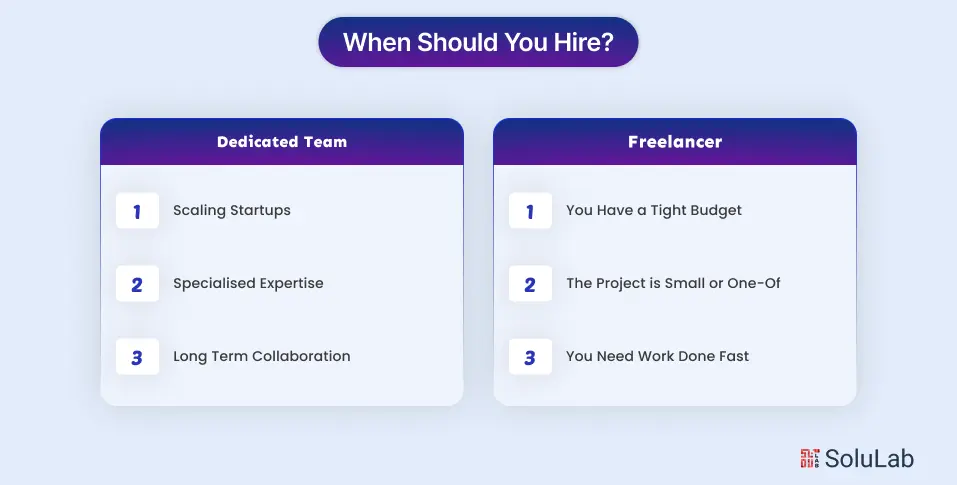
When Should You Hire a Freelancer?
Freelancers could be a smart choice when your needs are short-term or very specific. Here’s when it would make the most sense:
1. You have a tight budget: If you’re working with limited funds, a freelancer could help you get things done without the overhead of a full-time team. You only pay for what you need—no benefits, office space, or long-term commitments involved.
2. The project is small or one-off: Freelancers are perfect for tasks like fixing bugs, creating landing pages, or building MVPs. These projects wouldn’t require a full-time team and could be handled efficiently by a skilled solo expert.
3. You need work done fast: Need something done yesterday? Freelancers are often more agile than agencies or teams. If they have availability, they could jump in quickly and deliver results without too much onboarding.
4. You’re testing an idea: If you’re experimenting with a new feature, product, or business idea, hiring a freelancer would let you test it out without investing too heavily upfront.
Conclusion
The factors that decide between a dedicated team and a freelance developer are the size of your project, your budget, and what you want to accomplish over time. Building more complex or continual projects may require to hire dedicated developer to ensure things run smoothly and peacefully.
If your requirements are meant for only a short period or are set by a small budget, working with a freelancer suits your needs. There isn’t a universal answer; the important thing is to go with what fits your current situation. Spend some time figuring out what is important for you and select the setup that goes with those goals.
SoluLab, an enterprise software development company with its team can help you build software apps or platforms. Contact us today to discuss further.
FAQs
1. How do communication styles differ between dedicated developers and freelancers?
Freelancers often prefer asynchronous communication, like emails or chats. Dedicated teams usually hold regular meetings, give detailed updates, and have a more structured workflow.
2. Do both options require me to manage the project?
Freelancers often need more direct oversight. Dedicated teams usually come with a project manager, so you could stay focused on the bigger picture while they handle daily progress.
3. What kind of projects are best for freelancers?
Short-term, well-defined projects like creating a landing page, fixing bugs, or building a prototype work best with freelancers. It’s ideal when the scope and timelines are clear.
4. Are dedicated teams more reliable?
Generally, yes. With a team, you get consistent output, backups if someone’s unavailable, and accountability through structured processes. Freelancers might be more hit or miss.
5. Can I switch from a freelancer to a dedicated team later?
Absolutely. Many startups begin with freelancers and move to a team model as their project or business grows. Just make sure the transition is planned to avoid workflow gaps.

